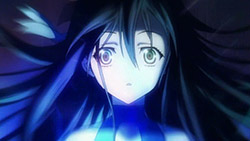 |
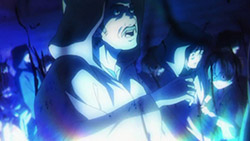 |
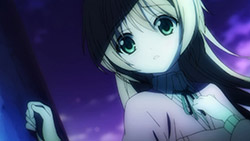 |
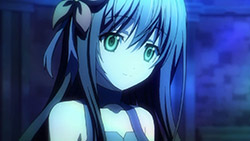 |
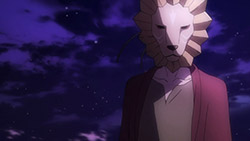 |
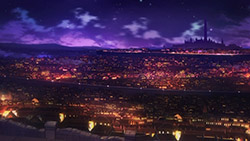 |
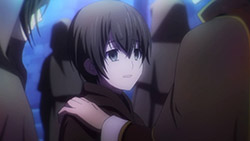 |
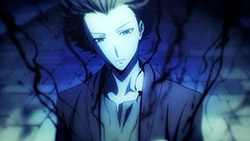 |
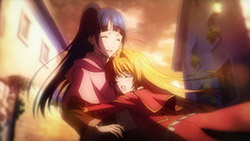 |
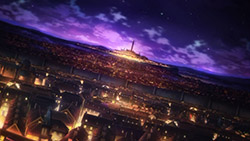 |
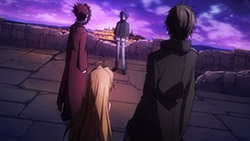 |
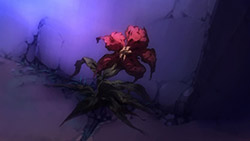 |
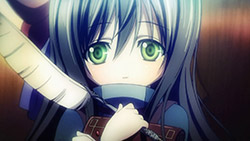 |
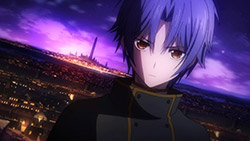 |
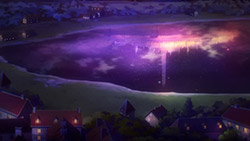 |
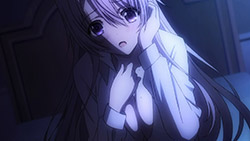 |
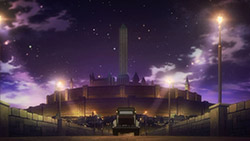 |
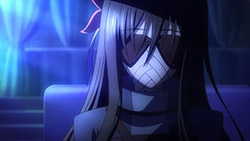 |
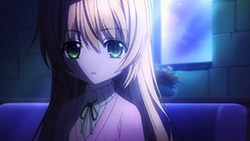 |
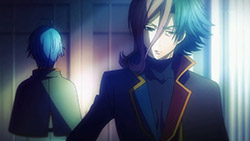 |
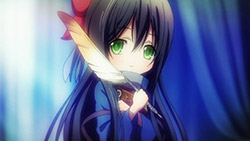 |
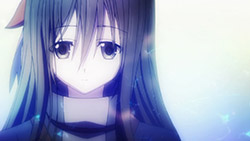 |
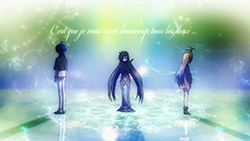 |
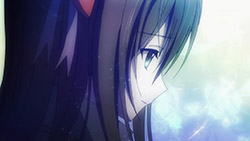 |
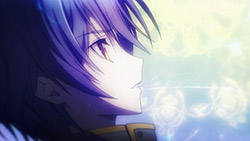 |
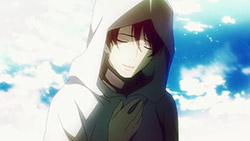 |
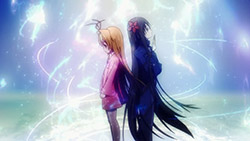 |
 |
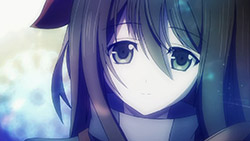 |
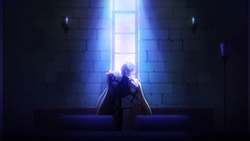 |
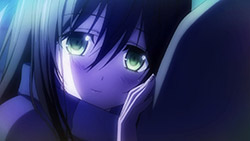 |
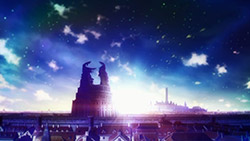 |
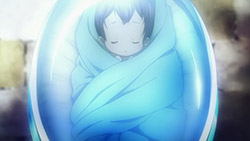 |
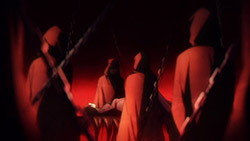 |
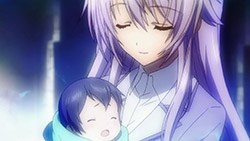 |
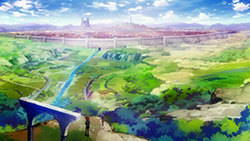 |
「オルタスIII」 (Orutasu III)
“Ortus III”
As of today, I feel that a re-evaluation of Kaminai is in order. The first few episodes had led me to believe that this would be a show that drives its plot around “solving” problems that arise throughout the world with Ai as the leading inspiration, but this arc has proven the show is less plot-driven than that. Instead, perhaps Kaminai is a story about painting the picture of the new world without God, and how various groups around the world have adjusted their values and their way of life. While Ai still is seeking answers to help those around her, this story will first challenge her worldviews and expose her to the full picture before any sort of “plot” will progress.
This show’s strong point does not lie in its ability to form a cohesive plot. The “dark secret” of Ortus wasn’t as surprising as it made itself out to be and mother of mercy, that baby literally came out of nowhere. There is much to the narration that leaves much to be desired in terms of cohesiveness, but again, that is something we must first admit about this show. Looking past that, the show has done an excellent job in painting the world that this story occurs in, both in developing the setting and in portraying that setting visually.
The fantasy elements portrayed in Kaminai have not been explained properly, but their effect on bringing out interesting human interactions is commendable. Ortus is a prime example of the uncertain morality that pervades this world—there still exists no agreement on what is morally right when it comes to life and death, where even Ai herself admits she has no answers to those dilemmas. Ortus’ dark secret is nothing of the sort vile or malicious—the city genuinely seeks to create a willing society of the dead that supports one another in this uncertain time, and never forces the conditions of entering the city on anyone. I was mightily and pleasantly surprised when children were allowed to defer their decision to die or leave till the age of 15—it is still quite a young age to make such a monumental decision, but it is a compromise that reflects thoughtfulness and respect on the part of Ortus’ governance. Though Ortus may not be perfect in requiring this irreversible oath on immigrants, it finds a balance between the pride of the dead and sensitivity to the living—it is a city that really is doing nothing wrong. As such, there is no antagonist in this story for us to focus Ai’s efforts on fixing, creating a setting where no one is necessarily right or wrong. Ulla cannot be labeled as in the wrong as much as Ai cannot be labeled as being in the right, though both suffer because of such uncertainty (however, this doesn’t prevent them from expressing their friendship beautifully). This is Kaminai’s strength—creating a world where the labels of good and evil, living or dead, cannot be placed easily.
On top of solidifying the direction of this show, today’s episode did a wonderful job in painting even grander and beautiful background and scenery shots, a constant throughout this entire series. The character drawings are of decent quality, but it is the backgrounds and additional post-processing that makes the visuals for this show. The color palette has this gentle touch about it, using a wide range of colors to illustrate this bright and hopeful days, the deceptive nights, and the sunrises that are symbolic of change and hope. In addition, the small visual details that are put in are a nice touch too, especially those that confirm the European setting—the use of French text, the architectural styles, the choice of cars, all of it ties in not only as a good visual, but also to help strengthen the great setting that Kaminai has constructed.
Now that we are leaving Ortus without harm to what seems to be an academy, we can now go forward knowing where the show’s direction lies. In a sense, it’s a very similar setup to how Kino no Tabi constructed itself—a young able child and their companions go forth around the world to discover new things, seeing just how each part of the world lives. As a consequence, both Ai and Kino shape their views on life with every place they visit, though without a clear end in sight.
Preview
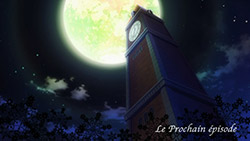 |
 |
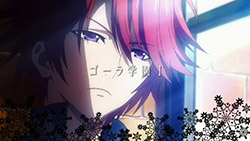 |

Although I do agree with you that it’s mostly about the journey for this show I do think there is in fact a greater plan in mind for the ending with not one but two special children now being adopted by Scar and Yuri. And with all the focus on the journey I do hope they leave enough time to wrap things up in a satisfactory manner…
This show never ceases to amaze me.
I was dissapointed with the first few episodes because of the pacing but this episode change my mind! This is good!
TQ
https://randomc.net/image/Kami-sama%20no%20Inai%20Nichiyoubi/Kami-sama%20no%20Inai%20Nichiyoubi%20-%2006%20-%20Large%2013.jpg
Yeah, i think we all know the real reason why people die when they see her.
I like your logic. 😀
You can die from HNNNNG’ing too hard?
But of coarse, you didn’t know? I’ve had several near death experiences during the time I’ve watched anime. It’s quite dangerous.
At least they died happy.
>First Paragraph
Now that’s a good way on how to say it Zani.
Beautiful episode, I loved it. The baby was unexpected though.
I found that plausible considering Scar’s condition: maternal’s instincts awakened by a childish presence (I never thought to be an infant, though).
Also, are Ulla and Celica’s mother a Grave keeper? She was able to copulate and get pregnant with an undead. Both the seeder and the harvester of life, how fascinating the Grave keepers are.
Oh gods. I’ve cried two times in six episodes. That’s a record.
i havent seen anything worth crying for.. yet. maybe because i felt no character attachment to them and those sad scenes are just too cheesy for me. thats my opinion, feel free to thumbs down if you want.
I honestly felt my heartstrings being tugged in the epilogue following Hampnie’s death. However, in this episode, I was too frustrated by Ai’s rash decision to feel anything for Ulla, and then too perplexed by Ulla’s sister coming out of nowhere to invest any emotion in what should be a beautiful scene– where a supposedly emotionless Gravekeeper ‘gives life’ to a baby. =/
My eyes(and ears) really loves this series
I saw God through these magical visuals, and heard him speak through this wonderful soundtrack. O_O…
I fell in love with not only Kiriko’s genuine confession, but the scene with all three of them.
I have to say I agree with you regarding Kiriko’s confession. It was so modest ans sincere.
You beat me to the similarities to Kino no Tabi. This show has become more poetic than rigorous in it’s world building: People made out of two other people, a girl who is death personified. Nothing wrong with that, just different than I was expecting. I though this show was going to be about unraveling why god forsake the planet and people stopped dying. Now it appears that it is going to be a travelogue of the effects of that. OTOH, the baby may be the key to the future. If Ulla accepted death (becoming the Idol of Murder), then perhaps the baby accepted life (becoming the Idol of Birth (Life, Resurection))?
A world where is nowhere to be found but granting the wishes of those who truly wish. In a way you could say that is not that the labels cannot be place easily Zanibas, I think God removed all the labels by living the world in this state; everything asociated to good and evil are gone because they were linked to the very concepts of life and death, take that away and you strip away the world of everything that form it sice the dawn of time.
It´s not that Ulla and Ai are partially right, it´s they are both right and wrong at the same time, because those are their answers to a world that no longer has the rules to dictate who hold the truth, at least for now.
Very well said, Zanibas. And very good episode.
I looked past the fact that the introduction of Ulla’s twin could have used more building up, simply because of the beautiful way it resolved the things between Ulla and Ai (and Kiriko).
That is one great friendship they got there. And Ulla saying that not being able to see and touch Ai saddens her tugged a heartstring. They are now in my top 5 favorite BFF characters.
And the visuals… God, this is scenery porn at its finest!
With Ortus arc all wrapped up (I still got a few questions but nah, nevermind), Alis finally appears!
Ulla = Ooohh laaa laaa
Oh and can someone provide me all of Ulla’s full-length images, can’t get enough of her
Kamisama is among the anime this season that I find to have a good story 🙂
Though when you related the phrase “a young able child and their companions go forth around the world to discover new things, seeing just how each part of the world lives” to Kino no Tabi, the first thing that came to my mind was Pokemon.. :p
i didn’t really understand this show until i’ve read your write-up, zanibas. it didn’t really click for me. last episode, when ai decided to break the news to ulla, i was a little disappointed that she basically wanted to fuck everything up. like you say, ortus doesn’t really do anything wrong. i was slightly relieved to see the connections drawn between ai and ulla’s story, how she just wanted to try and free ulla like hamburger helper freed her.
“i don’t get this,” “why,” and “who cares about life and death in these circumstances,” are all i can think about while watching this show but now i think i understand that this is the whole idea. i think i’ve finally reached a moment of clarity when it comes to trying to appreciate this show for more than its really really cute lolis.
the meaning behind life without death is a very weird topic to explore, especially when it seems so impossible, but then i realize that this is the kind of world that exists in Christian religion. limbo, heaven, and hell, in all realms the inhabitants live infinitely, just like the world in nichiyoubi. although it doesn’t seem like the inhabitants are infinitely suffering, it still makes me question just what would there be to look forward to in any sort of after life. i was never a strongly religious person, nor was i adamant about my ideas as an atheist, so while i always denied the possibility of an afterlife, i never questioned how utterly stupefying such a concept like that is.
I’m glad Ulla already knew to a certain extent what she was doing. I would’ve found it hard to believe that she was completely unaware.
Scar confirmed to be a baby snatcher, hide your kids people lol
Scar has pseudo pregnancy remember…I guess it’s okay if everyone agrees (only in the anime world people).
I didn’t enjoy Hampnie’s loli-punting, but I actually wished somebody would hit Ai this episode. Her innocent quest to reveal what she felt was important could have ended very badly. While I don’t mind fighting for truth, I believe that one should at least offer an alternative, particularly if the truth can potentially destroy a civilization. Ai didn’t offer anything except her sympathy and I’m left wondering why none of the adults tried to stop or reason with this 12 year old.
That grievance aside, the baby coming out of nowhere killed the closing scene for me. I mean, that was a really nice shot of the baby snatcher, but, er, buildup please?
Anyway, at least this episode leads more credence to Hampnie’s theory that god’s granting people’s wishes. Hopefully the next arc will be better.
You basically summed up everything I felt was wrong with this episode. I genuinely enjoyed Kaminai for the first five episodes – the world-building, the beautiful scenery porn, and Hampnie’s death in ep 3 – while a little bit too soon – was nicely executed and really got the tears running. But this episode I was too distracted by Ai’s actions in this episode and the random baby at the end to feel anything.
Ai practically had no justification for breaking the news to Ulla save for the fact that she felt it was the right thing to do – with no regards as to the implications it could have for the entire city of Ortus. Hell, Ulla could’ve gone insane from the revelation for all we know, and that doesn’t seem to be a possibility that Ai even considered.
I disagree. As someone who lived a life of lies, I can tell you that the truth is extremely liberating. The lies protect us but it protects us the same way a chain binds us. The truth can be the most potent weapon of them all but it also the most liberating of tools. You feel yourself to be at your most vulnerable but you also feel as if you could do anything. This is what I think.
TQ
I like this show. I do. But it’s also rather obvious that it’s missing a rather sizeable amount of context, at least some of which I have reason to believe does exist and should have been included. Perhaps it’s time to go pick up the light novels…
The similarities with Kino no Tabi are rather self-evident at this point, yes. There are two rather distinct differences, however – the first being that this story presents an ironically more stable setting than the often Jonathan Swift-like thematic representations that Kino visited. The second, of course, being that Kino was always somewhat apart from the setting, a clear outsider who would never become a part of the places she visited – the very definition of the endless wanderer. With this story, Ai is rather more involved – the implication being that at some point, her journey has to end, with some kind of answer to be found for herself at least. The scale of that eventual ending, of course, is rather in flux.
https://randomc.net/image/Kami-sama%20no%20Inai%20Nichiyoubi/Kami-sama%20no%20Inai%20Nichiyoubi%20-%2006%20-%20Large%2004.jpg
Death by Moe, literally. An ideal way to die if one ever goes weary of life (and still get to feast eyes on her in death). 😀
… when you have the original source being a straight narrative (a script similar to Maoyuu), deux ex machina like that is bound to happen sooner or later…
-still surprised that they have the budget for all that scenery as well as the revelation of Ulla, as they’re both beautiful.
-Ai is still being too innocent for her own good, needing Yuri to save her this time around.
-Scar’s way of “having a kid” is just as unusual as Scar herself…oh well. *rolls along with it*
Soooo, the infant is the elder sister of the two… time is stopped for her and trapped in a crystal?
Now, where did I see this kind plot… Some anime that has something to do with gems turning the MC into a hero or something, but cant remember the name…
So moe…I died!
That was the most abrupt route into motherhood I’ve ever seen and Scar got to skip the carrying and giving birth parts. Any woman who’s had a child before should be jealous of her :p
You know, the only person in that merry band who have any inkling of how to take care of a child is Yuri. And even that is sketchy since he seens to be the work-in-the-fields type of father. Not to mention that you need all kinds of stuff to take care of babies…